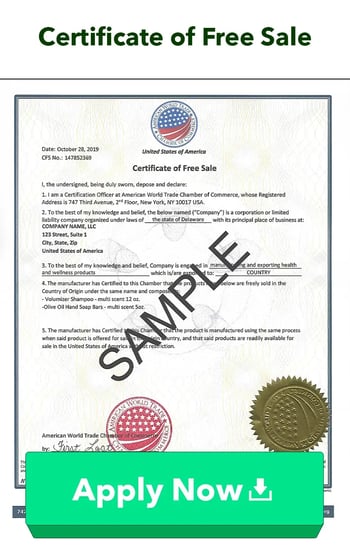![Certificate of Free Sale for Your Exports: When and Why You Need One [Webinar Recap] | Shipping Solutions](https://eximforbes.com/wp-content/uploads/2024/12/certificate-of-free-sale-for-your-exports-when-and-why-you-need-one-webinar-recap.jpg) When registering a new product for sale in a foreign country, the customs authority may require a Certificate of Free Sale to prove that your product is legally sold in the U.S. And even if customs doesn’t require one, your foreign buyer may.
When registering a new product for sale in a foreign country, the customs authority may require a Certificate of Free Sale to prove that your product is legally sold in the U.S. And even if customs doesn’t require one, your foreign buyer may.
Recently, we hosted a webinar featuring Alex Sonifrank from the American World Trade Chamber of Commerce (AWTCC) to explain what you need to know about this export document—when and why you might need one and the quickest way to obtain one. For those who could not attend, this article summarizes the key insights. But this is just some of what was discussed, and it’s not too late for you to watch the full recording. Watch the full webinar here: Certificate of Free Sale for Your Exports: When and Why You Need One.
What Is a Certificate of Free Sale?
A Certificate of Free Sale is an export document issued by a government authority, like the U.S. Food and Drug Administration (FDA), or a recognized organization, such as a chamber of commerce, certifying that a specific product is legally sold in the United States. It’s often required by customs authorities in importing countries to ensure that the product is legal and meets specific quality standards. Alex explains more in this clip from the webinar:
When Do You Need a Certificate of Free Sale?
Certificates of Free Sale are typically required in two scenarios:
1. Customs Requirements
Countries with rigorous import regulations may require a Certificate of Free Sale to verify the product’s legality and safety. Also, in certain cases, a Certificate of Free Sale can help expedite the import process under free trade agreements.
2. Importer Requests
Some importers may request a Certificate of Free Sale as part of their import procedures, even when not required by customs, especially for products that are subject to specific regulations or quality standards.
The reason a certificate of free sale is required will affect who needs to issue the document.
 Who Can Apply for a Certificate of Free Sale?
Who Can Apply for a Certificate of Free Sale?
Certificates of Free Sale are predominantly issued to exporters. Distributors are often the primary applicants. Typically manufacturers cannot request the Certificate of Free Sale, but they may need to provide additional documentation so one can be issued to an exporter.
How to Obtain a Certificate of Free Sale
To obtain a Certificate of Free Sale from AWTCC (one that does not require FDA approval), you typically need to:
- Fill out the registration form here (there’s no cost).
- Submit required documents in the online portal, such as the manufacturer’s declaration, commercial invoices to show supporting evidence of U.S. sales, and product specifications.
- Pay any applicable fees for processing and issuing the certificate.
- The issuing authority will review your application and issue the Certificate of Free Sale.
The AWTCC issues Certificates of Free Sale for products often challenging to document, including:
- Herbal supplements
- Cosmetics
- CBD products
- Fragrance items
- Food-contact products (sandwich bags, cutlery)
Other Things to Know About Certificates of Free Sale
Following are some other Certificate of Free Sale tips that are discussed in more detail during the webinar:
- A Certificate of Free Sale is a country-specific document.
- It is not specific to individual shipments (you can reuse it).
- It can cover multiple products.
- It is typically used to initially get a product registered in a foreign country and may not be required again in the future. However, best practice says the document is valid for about 1 year.
- Ensure product descriptions are consistent across all export documents and that they make sense to a third party.
- Be prepared for potential embassy legalization requirements, which can add a lot of time and money to the process. Ensure the importing country actually requires legalization before seeking it.
This recap is only a quick look at the information shared during the webinar. Watch the full recording now.
Like what you read? Join thousands of exporters and importers who subscribe to Passages: The International Trade Blog. You’ll get the latest news and tips for exporters and importers delivered right to your inbox.